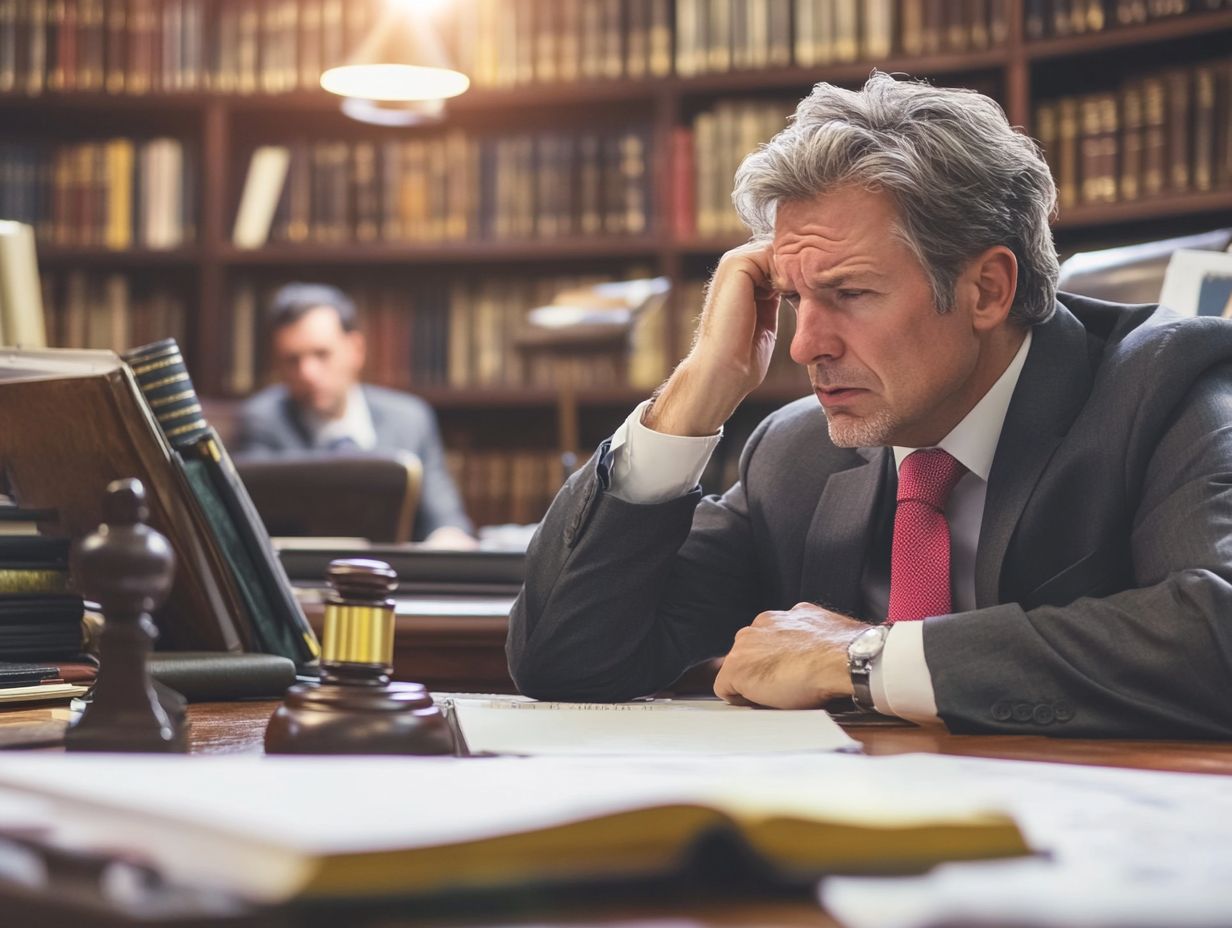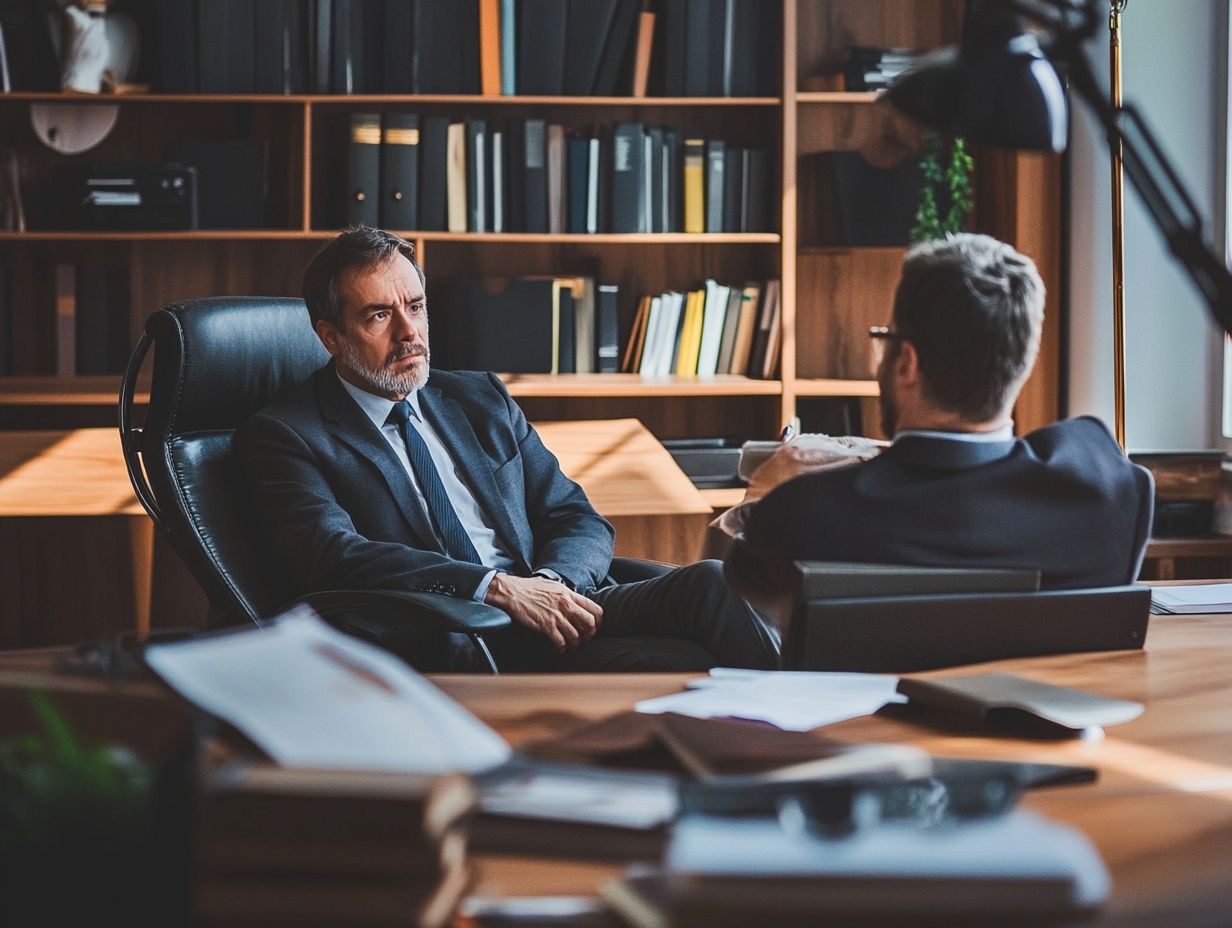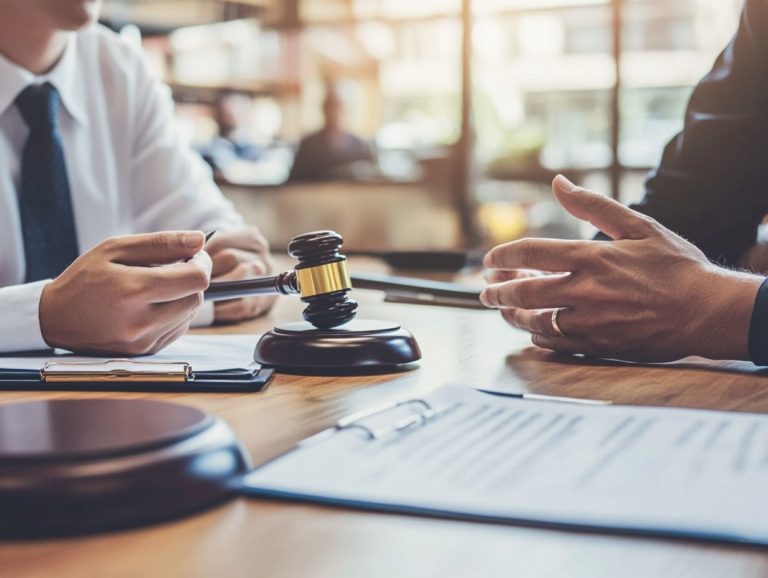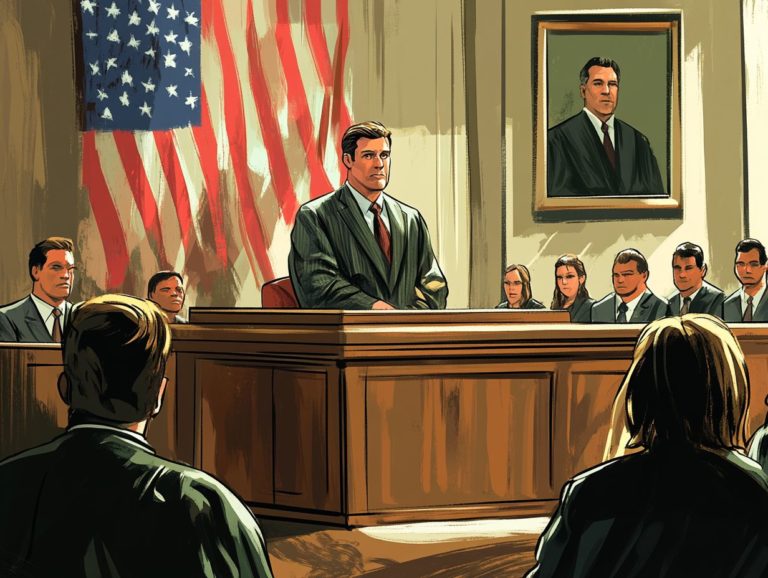5 Warning Signs of a Bad Defense Attorney
Choosing the right defense attorney can truly make or break your legal battle. But how can you tell if you ve made an unfortunate choice?
This article sheds light on five critical warning signs that may suggest you re dealing with a less-than-ideal lawyer. From communication breakdowns to a lack of specialization, it examines the red flags you should be vigilant about.
It also covers the essential qualities that define a competent defense attorney and offers insights on how to evaluate your options effectively.
Protect your case by knowing what to look for in a lawyer! Understand why selecting the right attorney is paramount.
Contents
- Key Takeaways:
- 1. Lack of Communication
- 2. Inadequate Preparation
- 3. Poor Track Record
- 4. Unprofessional Behavior
- 5. Lack of Specialization
- What Are the Responsibilities of a Defense Attorney?
- Frequently Asked Questions
- What are the warning signs of a bad defense attorney?
- Can a bad defense attorney affect the outcome of my case?
- What should I do if I have a bad defense attorney?
- Is it possible to switch to a different defense attorney in the middle of my case?
- Can I request a refund if I am not satisfied with my defense attorney’s services?
- How can I find a good defense attorney?
Key Takeaways:

Lack of communication can indicate a bad defense attorney, as it can lead to misunderstandings and lack of preparation for the case.
Inadequate preparation can result in a weak defense, putting the client’s case at risk.
A poor track record of successful cases can be a warning sign of a bad defense attorney, as it reflects their skills and abilities.
1. Lack of Communication
A lack of communication in the criminal justice system can seriously erode your confidence and legal representation. This often leads to misunderstandings and potentially unfavorable outcomes for your case.
Effective communication is crucial for ensuring your satisfaction. It often serves as the first red flag when hiring an attorney and sets the tone for your entire legal experience.
When you feel informed and involved, you re more likely to trust your legal counsel. You can actively participate in shaping your defense strategy.
Conversely, poor communication can leave you in the dark about plea options, court dates, or even the intricacies of legal terminology, making you feel anxious and lost.
For example, if your attorney doesn t clarify the implications of a plea deal, you might enter negotiations unprepared, putting your case at risk.
Responsive lawyers who prioritize clear and timely updates while fostering open dialogue can bridge these gaps. They ensure you understand your options and feel empowered throughout your defense journey.
2. Inadequate Preparation
Inadequate preparation can lead to serious repercussions in criminal defense cases. This often results in mismanaged strategies that jeopardize your attorney’s ability to advocate effectively against grave criminal charges.
A well-prepared case relies on your lawyer s expertise and significantly on the legal team members who help organize and manage your case.
The meticulous work of your legal team ensures that every piece of evidence is thoroughly examined. Relevant information must be readily accessible, both of which are crucial for crafting a compelling defense.
Your attorney must possess the necessary experience and expertise to navigate the complexities that arise in such cases. This combination of skilled legal representation and strong support can ultimately determine your outcome.
3. Poor Track Record
A poor track record in criminal defense should raise significant red flags when considering legal representation. It brings into question the attorney’s qualifications, ethical conduct, and overall effectiveness in handling cases.
To effectively assess an attorney’s history, it s essential to scrutinize online reviews and feedback from previous clients. These insights provide invaluable information about the legal professional’s performance.
Reviews often highlight specific strengths and weaknesses, offering you a clearer picture of what to expect.
An attorney’s reputation directly influences their ability to instill trust in clients an essential element for achieving successful legal outcomes.
A well-managed reputation reflects a commitment to client satisfaction and ethical standards, making it a critical factor in your hiring decision.
Ultimately, a solid reputation can bolster your confidence in your choice of legal representation.
4. Unprofessional Behavior

Unprofessional behavior by an attorney can profoundly undermine the integrity of the legal process. It can make you lose trust in them and often result in detrimental case outcomes and ethical violations.
When legal professionals fail to be punctual arriving late to meetings or missing critical deadlines it not only tarnishes their commitment but also disrupts workflow. This can jeopardize essential legal strategies.
Inappropriate communication, whether through overly casual language or dismissive attitudes toward you, can create barriers to trust and understanding.
A blatant disregard for legal ethics can lead to serious consequences, including disciplinary actions and the loss of licensure.
The cumulative effect of such unprofessional behaviors can leave you feeling significantly dissatisfied. This detracts from the overall reputation of the legal profession and leads to an erosion of trust in the entire system.
5. Lack of Specialization
When you’re selecting a criminal defense attorney, the absence of specialization can be a pivotal concern. Expertise in specific areas of law is essential for crafting effective case strategies and securing better outcomes.
An attorney who understands the intricacies of relevant criminal charges will adeptly navigate the complexities of the legal landscape. Their familiarity with local laws and judicial tendencies can significantly influence your case’s trajectory.
A specialized attorney can tap into relationships with key stakeholders, such as judges and prosecutors, to negotiate outcomes that a general practitioner might miss.
Choosing a specialized attorney can dramatically improve your chances of winning. It also provides you with invaluable peace of mind during a challenging time.
What Are the Responsibilities of a Defense Attorney?
A defense attorney is your lifeline in the criminal justice system, shouldering a wealth of responsibilities. They provide legal representation, formulate case strategies, and ensure effective communication with clients throughout the legal process all while upholding strict ethical standards.
You ll find this professional meticulously preparing for trial by gathering evidence, interviewing witnesses, and researching relevant legal precedents. This helps to build a robust defense on your behalf.
They negotiate plea deals agreements to reduce charges in exchange for a guilty plea to secure favorable outcomes, often easing the burden of prolonged court battles.
Beyond courtroom tactics, the attorney s advisory role is invaluable; they guide you through the implications of your decisions while remaining dedicated to ethical conduct. Maintaining high standards of knowledge and integrity is essential, as the stakes for you can be incredibly high.
What Qualities Should a Good Defense Attorney Have?
A good defense attorney embodies several key qualities essential for your success. These include strong communication skills, responsiveness to your concerns, and a deep understanding of legal ethics and criminal defense strategies.
These traits contribute to achieving your satisfaction and favorable outcomes in your case. Analytical thinking is vital; it allows the attorney to dissect complex legal issues and anticipate potential challenges, crucial for crafting effective defense strategies.
For instance, a skilled attorney can evaluate the strengths and weaknesses of your case to foresee the prosecution’s arguments, enabling a more strategic approach.
Empathy also plays a significant role in building a strong attorney-client relationship, helping you feel understood and supported throughout the often stressful legal process.
Negotiation skills are also crucial; a capable attorney can advocate effectively for you, seeking plea deals that might mitigate charges or reduce sentences.
Together, these attributes enhance their ability to navigate the intricacies of the legal system on your behalf.
Don’t settle for anything less than the best representation during this critical time.
How Can One Find a Reliable Defense Attorney?

Finding a reliable defense attorney requires careful consideration of several key factors, including their reputation, communication style, and familiarity with the local legal system. Examine online reviews to gauge overall satisfaction and effectiveness.
Research multiple attorneys to compare their styles and specialties. Ask for referrals from trusted friends or family for valuable insights into an attorney’s approach and success rate.
Once you have a shortlist, attend initial consultations to assess whether the attorney s communication style meets your expectations. Clarify their fees and fee agreements upfront to avoid unwelcome surprises later on. This will ensure your chosen candidates align with your budgetary needs and the value of their services.
What Are the Consequences of Hiring a Bad Defense Attorney?
Hiring a subpar defense attorney can lead to severe repercussions, including wrongful criminal convictions and ineffective legal strategies. This can result in dissatisfaction with the representation you receive.
A defense lawyer lacking adequate training might miss critical evidence or fail to present a persuasive argument, diminishing your chances of achieving a favorable outcome.
There are high-profile cases where inadequate legal strategies resulted in wrongful imprisonment for years. This underscores the urgent need to prioritize competency during the hiring process.
Choosing attorneys without proper vetting may mean ending up with professionals lacking experience in navigating courtroom complexities. This oversight can significantly increase the risk of negative outcomes in your case.
Take the time to research an attorney s qualifications and performance history. This ensures you secure capable representation for your legal challenges.
How Can One Evaluate the Performance of Their Defense Attorney?
Evaluating your defense attorney’s performance involves examining key factors, such as their communication effectiveness, adherence to your case strategy, and management of your expectations throughout the legal process.
Note how responsive the attorney is to your inquiries, as this reflects their commitment to keeping you informed. Reviewing case outcomes can provide insights into the attorney s effectiveness and their ability to navigate the legal landscape. Client satisfaction should also be a significant aspect of your evaluation, as it speaks to the quality of representation you receive.
Establishing an ongoing feedback loop is essential for addressing concerns that may arise during your case. This approach promotes continuous improvement and reinforces the trust between you and your attorney, ensuring a collaborative relationship throughout your legal journey.
What Are the Benefits of Hiring a Skilled and Experienced Defense Attorney?
Hiring a skilled and experienced defense attorney can enhance your case outcomes, help with negotiating plea deals, and elevate your overall satisfaction. These are essential elements in navigating the criminal justice system.
Research shows that defendants with experienced legal representation are 2.5 times more likely to avoid incarceration compared to those without proper support.
Consider a notable case where a savvy attorney successfully negotiated a significant reduction in charges for a client facing serious drug offenses. This led to a lighter sentence and an opportunity for rehabilitation.
Such examples highlight the invaluable advantages that seasoned professionals provide, ensuring you receive fair treatment and a thorough understanding of your rights and options throughout the process.
Frequently Asked Questions

What are the warning signs of a bad defense attorney?
1. Lack of Experience: A bad defense attorney often lacks experience in criminal cases. This can result in poor legal help for you.
2. Poor Communication: Your attorney should respond promptly to your calls and emails. If they fail to keep you updated, it may indicate incompetence or a lack of interest.
3. Unreasonable Fees: Be cautious of attorneys who charge unusually high fees or demand payment upfront. This can be a red flag for their lack of confidence in winning your case.
4. Disorganized and Unprepared: A bad defense attorney may seem disorganized or confused during meetings or court proceedings, which can negatively impact your case. To avoid this, learn how to spot a good defense attorney.
5. Limited Availability: A good defense attorney is available when needed. If your attorney is frequently busy or unavailable, it could hinder your case’s progress.
Can a bad defense attorney affect the outcome of my case?
Yes, a bad defense attorney can significantly impact the outcome of your case. Inexperienced or negligent attorneys may fail to provide a strong defense, leading to negative results for you.
What should I do if I have a bad defense attorney?
If you believe your attorney is not providing adequate support, discuss your concerns with them. If the issues continue, you might need to find a new attorney or file a complaint with the state bar association.
Is it possible to switch to a different defense attorney in the middle of my case?
Yes, you can switch attorneys during your case. However, it’s essential to discuss this decision with your current attorney and follow the proper procedures to withdraw your representation agreement.
Can I request a refund if I am not satisfied with my defense attorney’s services?
It is not standard for attorneys to offer refunds, even if you’re dissatisfied with their services. However, you can file a complaint with the state bar association or seek legal action if you believe your attorney acted unethically or fraudulently.
How can I find a good defense attorney?
To find a good defense attorney, ask for recommendations from trusted sources friends, family, or other attorneys. You can also research online or contact your local bar association for referrals. Schedule consultations and ask questions to ensure the attorney has the right experience and qualifications for your case.






